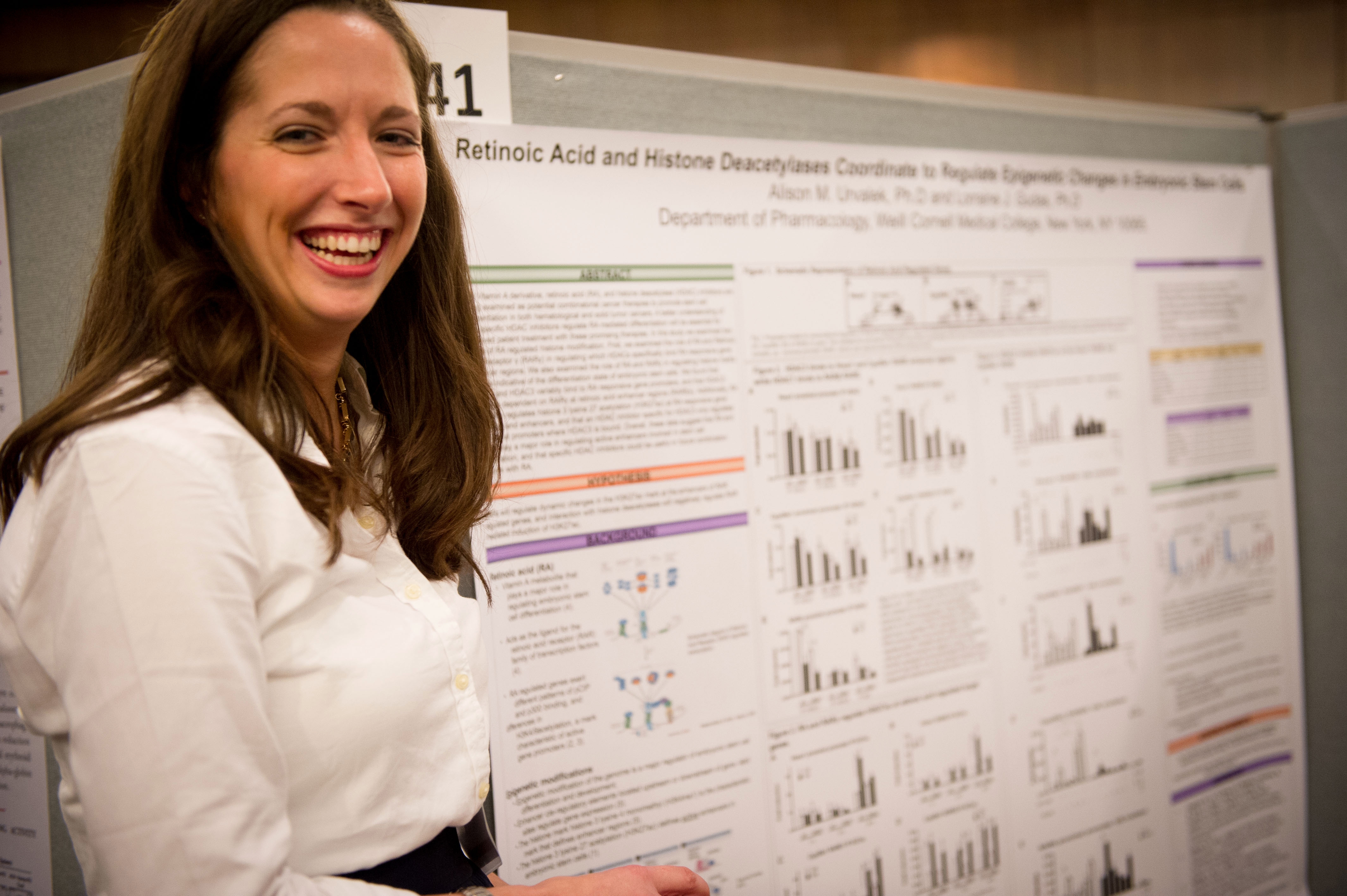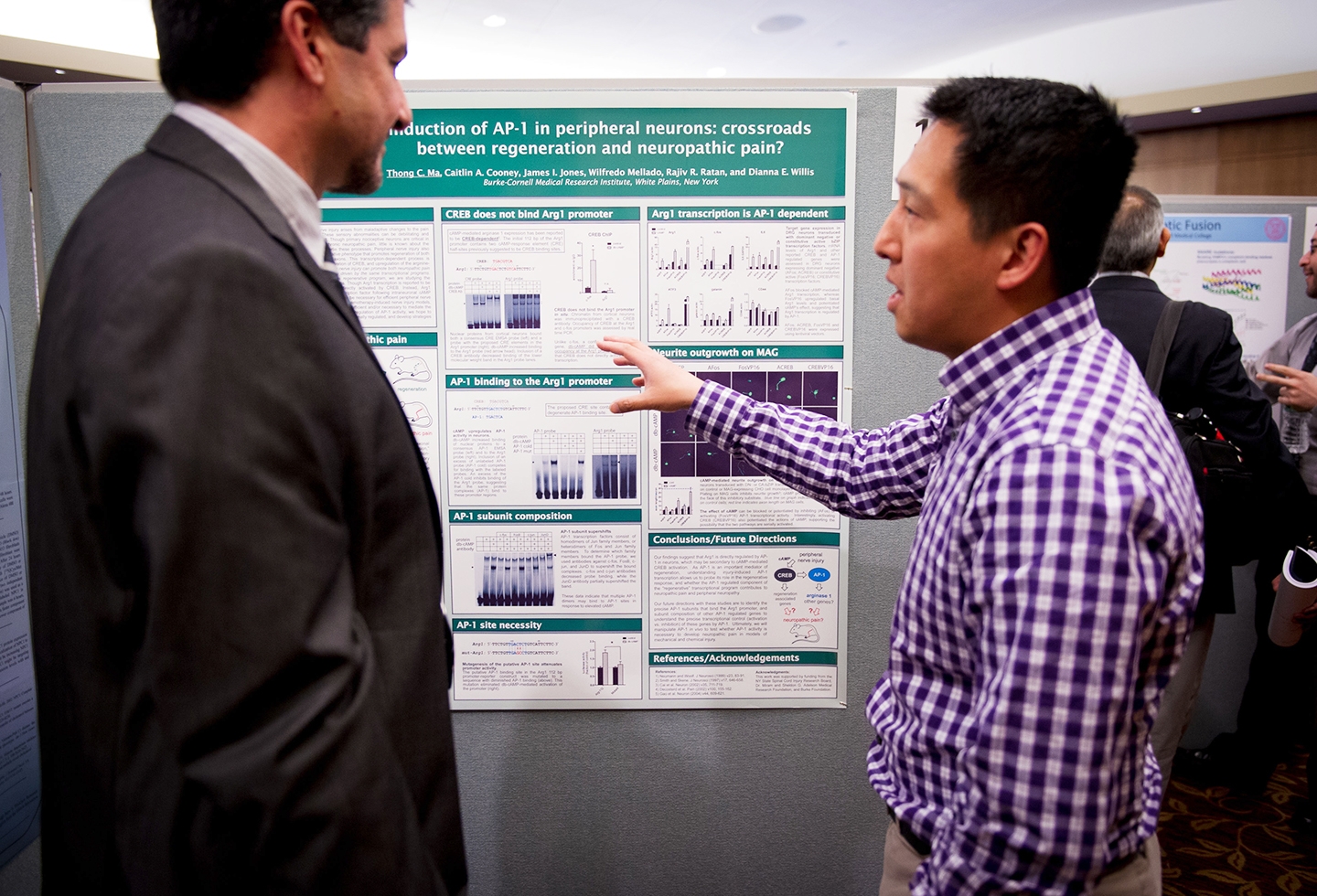Health care is undergoing a broad transformation and biomedical research — with its emphasis on doing the basic science that makes clinical treatments possible — has not been unaffected.
The eighth annual Postdoctoral Research Day at Weill Cornell April 4 reflected these changes by exposing Weill Cornell postdoctoral associates to the pharmaceutical industry's perspective on changes taking place in the way that basic science research is funded and how that science is being translated into treatments for patients.
As in previous Postdoctoral Research Day events, the emphasis was on sharing research within the Weill Cornell community. However, this year the planning committee members had a second goal.
"This year we tried to include the pharmaceutical industry to increase the collaborations" between Weill Cornell postdocs and pharmaceutical company researchers, said Dr. Alison Urvalek, a member of Weill Cornell's Postdoctoral Association Executive Committee and a postdoctoral associate in the lab of Dr. Lorraine Gudas, chair of the Department of Pharmacology.
The changes affecting postdoctoral associates are two-fold. On one hand, there are fewer faculty positions available in biomedical research institutions. Secondly, the way in which pharmaceutical companies acquire and develop research from academic labs is also changing.
"The funding environment is changing," said Dr. Randi Silver, faculty director of the Office of Postdoctoral Affairs, interim dean of the Weill Cornell Graduate School of Medical Sciences and a professor of physiology and biophysics. "Only 15 percent of biomedical Ph.D.s go into academia. This program provides an opportunity to have our postdocs exposed early on to industry models and collaborative opportunities."

Postdoctoral Associate Dr. Alison Urvalek presents her poster, "Regulation of embryonic stem cell differentiation state by retinoic acid and histone deacetylases."
The approach was practical, said Dr. Urvalek. "Going into academia is very difficult," she said. "You have to be open to other options."
The event was also an opportunity for postdocs — who often spend a great deal of time focused on their own very specific research areas — to meet with colleagues. The postdocs presented more than 70 posters in an open session in Griffis Faculty Club. Postdocs interacted with each other, faculty and scientists from the pharmaceutical industry, as well as Weill Cornell Graduate School alums working in industry, to discuss their research in an informal setting.
"We're trying to have an open forum for postdocs to talk with other postdocs. You can get so involved in a particular area; this is more of a forum," said Dr. Kwame Osei-Sarfo, a postdoctoral associate and vice president of the Postdoctoral Association Executive Committee.
Previously, Postdoctoral Research Day events have featured podium presentations by postdoctoral associates on their research and a formal judging and awards ceremony for the best research. This year, faculty with industry experience and leaders from the pharmaceutical industry took the stage.
In his keynote presentation, Dr. Greg Petsko, the Arthur J. Mahon Professor of Neurology and Neuroscience at Weill Cornell, outlined a series of dogmas in drug discovery and suggested that Weill Cornell postdocs break free of these informal rules to make the biggest impact, both in their careers and for the patients they hope will benefit from their research.

Postdoctoral Associate Dr. Thong Ma, right, presents his poster, "Induction of AP--1 in peripheral neurons: crossroads between regeneration and neuropathic pain?," to Dr. Andy Giovanni, translational medicine expert at the pharmaceutical company Sanofi.
"Our ability to create drugs has been the subject of a series of paradigms that actually stifle drug discovery," Dr. Petsko suggested. Some of these paradigms, such as "Lipinski's rule of five" — a rule of thumb used to judge the potential pharmacological activity of a molecule based on qualities like the number of hydrogen bonds or molecular mass — limit the number of compounds researchers routinely screen for activity against a drug target. Others suggest that certain molecular targets themselves should be dismissed outright.
"Just because no one has done it, doesn't mean it can't be done," Dr. Petsko said. "I don't believe there are any undruggable targets."
The event also featured a panel discussion by leaders from pharmaceutical companies who provided Weill Cornell postdocs with practical advice on how to partner with the pharmaceutical industry. Postdocs interested in developing collaborative relationships with industry need to remain flexible, the panel suggested, as well as develop a team mentality in their approach to science.
"The concept of team when you get into industry — where the impact of what you contribute to the company goes far beyond what you do individually — it's very different from academia, and you have to get your head around that," said Dr. Richard Murray, vice president of the Global Center for Scientific Affairs at Merck. "Think about team versus individual; and flexibility, really 'survival of the most flexible.'"
Importantly, Weill Cornell Medical College also outlined new initiatives to help postdocs develop relationships with industry. Recently, the medical college launched the Faculty Industry Council, a group of pharmaceutical leaders chaired by Dr. Richard Pasternak, formerly head of Global Scientific Affairs and Scientific Leadership at Merck, that provides Weill Cornell faculty with advice on the relevance of their research to engage industry interest.
Dr. Caren Heller, associate dean for intercampus and industry initiatives, assistant professor of public health and co-chair of the Faculty Industry Council, also announced the development of a postdoc-industry mentoring network to launch in fiscal year 2014. The goal is have 20 mentors providing guidance to postdocs as they compete for a $50,000 grant based on proposals for research.

